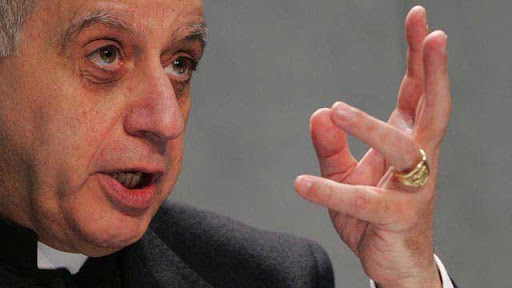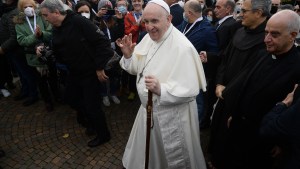Archbishop Rino Fisichella, president of the Pontifical Council for the Promotion of the New Evangelization, worries that we live in a culture that often leads to despising the poor, to making them responsible and guilty for their poverty. “This is wrong,” he says, as he speaks with us about Pope Francis’ pilgrimage with the poor to Assisi.
The archbishop’s dicastery sponsored the event. He tells us of its importance, in giving Pope Francis the opportunity to listen, and to pray and be with the poor.
What do you expect from this meeting?
Archbishop Fisichella: For Pope Francis, the meeting in Assisi is intended to be a great moment of listening to the poor. This is the deepest reason that brings him once again to the land of St. Francis of Assisi: to listen to the experience that the poor will bring him. There will be stories of daily life, experiences of suffering, experiences of hope as well, and the Pope will listen. I believe that this is the first element and the first desire of Pope Francis.
We often think that the poor are numbers, statistics, and that is not the case. The poor are people who have a life, a story, an experience. Listening to them is a provocation, a stimulus, to try to give concrete answers, especially looking to the future.
During Pope Francis’ other trips to Assisi, he has often met with the poor. What is special about this next meeting?
Archbishop Fisichella: I don’t think there is anything special that will make the headlines. The poor don’t make the headlines. But if the poor meet the Pope, then suddenly it becomes news, which can make many people think.
The Pope will meet only a small group of poor people, because the provisions against Covid-19 still oblige us to respect the distances and therefore to occupy only a third of the capacity of Santa Maria degli Angeli, even though it is very large. There will be only 500 poor people, but they will be the symbol, they will be the representatives of those millions of poor people who have no voice, who cannot make their cry of hope heard. Some of them will become the voice of all, and that’s the important thing.
Another important thing is that they will pray together. Once he has listened to the poor, the Pope will pray with them, because that is our way of life: listening and praying, which then becomes concrete help and solidarity.
Why did you choose to hold this meeting in Assisi?
Archbishop Fisichella: This year is the fifth anniversary of the World Day of the Poor, so it is a moment in the life of the Church that is beginning to become, let us say, a tradition. Going to Assisi meant making a pilgrimage of sorts, a pilgrimage that all the poor will make, together with Pope Francis. There will be poor people from France, Spain, Poland and Belgium, accompanied by the Fratello Association. There will also be the poor who will come from all the dioceses of Umbria and then also from the Pope’s diocese, from Rome, to share with all the same experience of solidarity and faith.
Assisi has therefore become the most significant point for celebrating and remembering an anniversary like the first five years. Assisi becomes once again a special city, because Assisi is a special city. It is the city of St. Francis, who is the father of the poor, the one who shared his whole life with the poor. And especially at the Porziuncola, where the Pope will go tomorrow.
At the Porziuncola, St. Francis used to gather not only his brothers, but also the poor who came to visit him and live with him. It is a place where one can begin to rebuild. For St. Francis, the Porziuncola was the realization of this image, of this dream that he had received from God asking him to rebuild his Church; only, the Lord was not asking him for a church made of bricks, but a church made of living stones.
Going to the Porziuncola is therefore not only a meeting but also a challenge to always start from the poor to renew the face of the Church in today’s world.
Why is this meeting on Friday and not on November 14, the actual day of the World Day of the Poor?
Archbishop Fisichella: World Day of the Poor is always celebrated on Sunday and the Pope, as Bishop of Rome, is very keen to celebrate this day in his diocese. But in recent years there have been Fridays of Mercy, and tomorrow’s gesture can really be considered a Friday of Mercy in addition to those that the Pope has led in recent years.
Eight years into his pontificate, do you think Pope Francis has been successful in bringing the Church to the peripheries?
Archbishop Fisichella: I think the Church has always lived with the poor. The events of 2,000 years of our history have certainly had their ups and downs, but the Church has never forgotten the poor. The Church has always lived a particular life experience with different forms of poverty. It is the history of the Church, and it is the history of so many saints who, in different parts of the world, at a given moment in their lives, felt that they had to dedicate their lives to the poor. That’s how we got Camille de Lellis, John Baptiste de La Salle, Mother Teresa, etc. That’s how we got so many men and women of all ages who felt the need to dedicate their lives to the poorest.
Pope Francis has also made the poor an emblematic point of his pontificate. He wanted to emphasize, first with his name, the importance of this presence in the life of the Church, especially because we live in a culture that often leads to despising the poor, to making them responsible and guilty for their poverty. This is wrong, it is unfair to them, and that is why I believe that the Pope’s strong call to look at the peripheries also starts from the awareness that we must be at the center.
The peripheries are determined by the fact that there is a center. The center is the heart, the heart of life, of the pulsating Church, it is the poor Jesus who identified himself with the poor. That is why we are invited, starting from this original poverty that the Son of God experienced in his own life, to go to the peripheries and thus to take up the cry for justice, the cry for solidarity that comes from millions of people.


